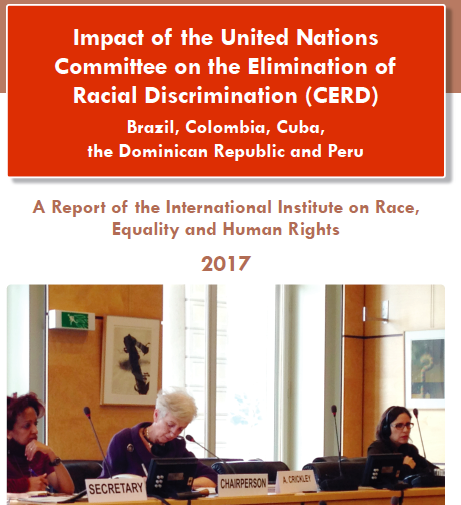Race & Equality Releases New Report on Impact of CERD in Region
Washington, D.C. July 31, 2017 – The Institute on Race, Equality and Human Rights is pleased to announce the release of a new report: The Impact of the United Nations […]

Washington, D.C. July 31, 2017 – The Institute on Race, Equality and Human Rights is pleased to announce the release of a new report: The Impact of the United Nations Committee on the Elimination of Racial in Discrimination (CERD) in Brazil, Colombia, Cuba, the Dominican Republic and Peru. The study found that while the Committee has helped move forward the struggle against racism and racial discrimination in certain parts of the region, its impact has been uneven and its potential as a mechanism for widespread, sustained change has yet to be fully realized.
The report found that some countries – Colombia and Peru most notably – have increased their engagement with the Committee, leading to positive, if halting gains. The Colombia government continues to support, at least rhetorically, greater Afro-Colombian and indigenous political participation. And Peru has begun work on some of the Committee’s recommendations, including improvement of the national census to better count its ethnic populations.
But its work in other countries has been more problematic, the report found. Brazil has not submitted a report to CERD since 2003, which has meant the Committee has not engaged with the country for over a decade. The Dominican Republic and Cuba have continued to participate in the CERD process, submitting reports and undergoing reviews. Unfortunately, this has not led the countries to adequately tackle discrimination; both the Dominican Republic and Cuba still largely deny that racism and racial discrimination exist in their societies.
These mixed results are the result of confluence of factors, according to the report. States have failed to fulfill their obligations, turning in late reports that do not conform to the Committee’s guidelines and ignoring most of the Committee’s recommendations. At the same time, civil society hasn’t taken advantage of the Committee as an advocacy tool. Organizations in the region don’t prioritize work with the Committee. Those that do engage with CERD do not see the process through, ending their work after the review sessions without doing important follow-up activities. And the Committee itself has not performed as well as it could. The quality of members continues to be uneven, and the Committee hasn’t reached out effectively enough to civil society. Many experts and activists working on racial discrimination in the region know very little about the Committee’s work. And aside from the small number of activists submit alternative reports travel to the reviews sessions, interaction between the Committee and civil society remains almost non-existent.
Despite these challenges, the report remains optimistic that CERD can strengthen its impact in the region. Amongst other recommendations, the report calls for the following actions:
- The Committee must do more to raise awareness about its work, prioritizing an effective communications strategy and working with civil society to spread its message;
- States must make a better effort to implement the Committee’s recommendations, as these represent the crux of the CERD process and the key to meeting their international obligations;
- Civil society organizations working on CERD must deepen grassroots involvement in the Committee’s work and prioritize follow-up work with the Committee, especially monitoring work.
The report has been a concerted endeavor by Race & Equality to support the implementation of the Convention on the Elimination of Racial Discrimination and was inspired by the Convention’s 50th anniversary in 2015. The report also seeks to contribute to the United Nations’ work on Afro-descendant issues during the International Decade for People of African Descent, 2015-2024.

